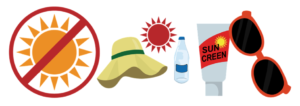Created on
Peds Quiz - Summer 2022
Author: Timothy York, DO, FACOP, FAAP

Summertime is a busy time for both Pediatricians and Parents alike. In days of old, children were often outside from daylight till dark; playing with friends and enjoying their summer break from school. It is a time when Pediatric injuries are potentially at their highest levels. Skateboards, bicycles, hover boards, swimming pools, jet skis, boats, go carts, and recreational sports such as basketball, golf, summer league softball and more. It is literally a smorgasbord of fun filled days. Oh, but the worries it brings for parents and grandparents who try to keep up with these youngsters! Things like sunscreen, insect repellant, meals t.i.d, water, and first aid for those lumps, bumps and scrapes. Calgon take me away! So we often escape to the beach for some needed rest and recuperation. Yet, our work is never far behind!
You are vacationing at a private beach when you notice a crowd of people gathered around a young child with the life guard present. Fearing a shark attack, you instinctively rush over rendering aid. It has, thus far, been a beautiful, hot, day at the beach with a temperature rising to 95 degrees resulting in a heat index over 100 degrees. Lying on the beach is a 6 year old male who had been exuberantly building a sand castle for some time. His sunscreen had clearly washed off as his skin was red and dry. Parents convey to the lifeguard he had been fine until an hour ago when he began to complain of a headache. He was offered a drink of water at that time, but refused and continued playing. He later complained of feeling sick to his stomach (nauseated) and vomited on his mother’s beach towel. His parents thought it was just some bad seafood consumed last night at the local crab shack. His father stated, “I told him not to get in the water for at least one hour after eating breakfast this morning”. Therefore, the child would not get into the ocean, at all, today. “I looked over, and he just fell out in the sand”, stated his father. You intervene, checking for a pulse while the lifeguard sets up the AED. The child regains consciousness, but remains confused. He has a rapid, bounding pulse. He has no allergies and is not a known diabetic. You immediately direct the lifeguard to radio for 911 and emergency transport.